Mobile Money transactions continue to expand rapidly compared with a few years ago, data from the Bank of Ghana has revealed.
In 2021 alone, about ¢905.1 billion transactions were recorded, and if the current trend is to go by, the transactions may reach or exceed ¢1 trillion in 2022.
However, a cursory look at the 2021 figures indicates fluctuations in Mobile Money transactions, month-on-month.
For instance, in July 2021, ¢99.1 billion was recorded. It was also actually the month with the biggest transactions.
Right after July 2021, the transactions dipped to ¢81.8 billion in August 2021 and subsequently to ¢71 billion in September 2021, but inched up to ¢80.0 billion in October 2021.
Before July 2021, Mobile Money transactions had surged consistently from March 2021 to June 2021.
In March 2021, it went up to 82.3 billion and then to ¢83.8 billion in April 2021. It later shot up to ¢86.5 billion in May 2021 and subsequently to ¢89.1 billion in June 2021.

¢86.1 billion and ¢82.9 billion were recorded as Mobile Money transactions in October 2021 and November 2021, respectively.
Fast forward, comparing January 2022 (¢76.2 billion) figure to February 2022 (¢67.1 billion) figure, one could deduce that if the trend continues, then Mobile Money transactions will grow significantly this year.
Secondly, according to the Bank of Ghana, registered Mobile Money Accounts have grown from 40 million in January 2021 to ¢48.4 million.
Again, active Mobile Money Accounts went up by 100,000 to 17.4 million as of the end of January 2022.
This indicates that Mobil Money Transactions will continue to soar in the coming months.
However, the Electronic Transaction Levy, which is on hold for now, could impede the growth of mobile money if passed into law.
That is because of the experiences in countries such as Uganda, where mobile money transactions dipped after a tax was introduced on it by the government.
However, for now, mobile money will dominate as the primary mode of payments for many individual and retail consumers in the country.
Latest Stories
-
Ghana is uniquely positioned to leverage AI to lead innovation in Africa – Deloitte Transactions Partner
10 seconds -
3 pupils, taxi driver killed in crash near Winneba Junction
2 minutes -
Economy to grow by more than 4.8% in 2025 – IC Research
6 minutes -
US visa tips: 10 key insights revealed by the US Consul General on Joy FM’s SMS
16 minutes -
Scars of Hooliganism: ‘It’s the worst thing you can think of’ – Maxwell Konadu on violence
32 minutes -
NIA workers declare strike action over withheld allowances
36 minutes -
Rehoboth Properties responds to allegations of power theft at Kweiman Estate
49 minutes -
Your social media activity can affect your student visa application – U.S. Consul General
56 minutes -
GJA elections committee chairman reaffirms commitment to credible polls
2 hours -
Visa denial is not deliberate; adhere to the rules – U.S Consul General
2 hours -
Part of Accra Sports Stadium still closed as NSA lacks funds for repairs
2 hours -
Haruna Mohammed calls for amendment of political parties act to enable financial independence
2 hours -
Stakeholders advocate professional development for teachers in the standards-based curriculum
2 hours -
Sheffield United invited entire Shooting Stars team for trials because of me – Rashid Fuseini
2 hours -
Do not apply for visa through agents; they are liars – U.S. Consul General
2 hours

